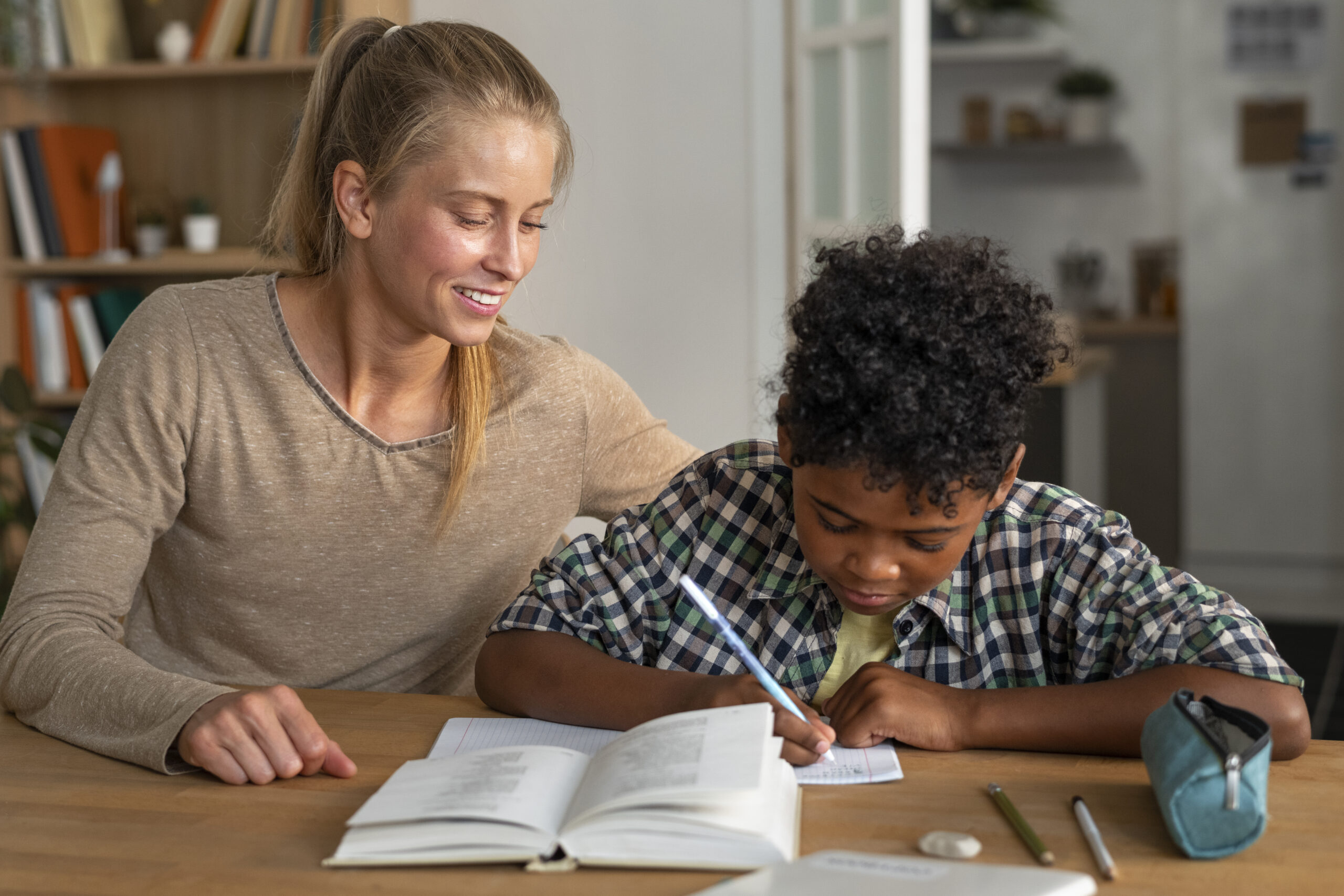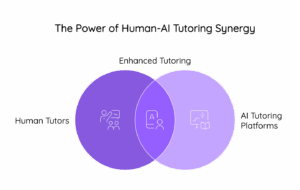
30 Jul Why Human Tutors Still Matter: The Role of Trained Adults in an AI-Enhanced Tutoring Era
Written by Candice Morris | Edited by Cara Catalano

As high-dosage tutoring (HDT) gains momentum in schools across the country, education leaders are increasingly asking a critical question: What is the role of human tutors in a world that is rapidly embracing artificial intelligence?
Across the education landscape, AI is expanding opportunities to personalize instruction, increase access, and improve delivery. However, despite these advancements, one element remains essential. A trained, consistent adult continues to make the greatest difference in supporting student learning.
Especially for younger students or those striving to meet grade-level expectations, human connection is the foundation for academic growth. The most effective tutoring programs pair adaptive technology with a tutor who is present, prepared, and trusted.
The Research Is Clear: People Matter
A 2024 randomized study from the University of Chicago Education Lab demonstrated that in-school tutoring led by well-trained adults significantly improved student achievement. The strongest outcomes occurred in programs that were embedded during the school day and aligned with classroom instruction.
While AI offers powerful tools, its greatest impact occurs when used in support of human tutors. Trained educators provide the trust, emotional support, and instructional responsiveness that technology alone cannot replicate.
AI Supports Tutors. It Does Not Replace Them.
The rise of AI tutoring platforms has sparked critical conversations about the future of instruction. Questions continue to arise about whether technology can fully replace live teaching, whether it can scale effectively, and how it serves students with complex academic or emotional needs.
Artificial intelligence has made significant progress. It can generate practice problems, adapt content based on performance, and provide real-time feedback. However, it cannot identify the subtle signs of frustration in a student who is about to give up. It cannot build trust through weeks of consistent encouragement. And it cannot pause, look a student in the eye, and say, “I know this is hard, but I believe you can do it.”
The future of effective tutoring lies in combining human expertise with the efficiency of AI. When tutors are equipped with real-time progress data and adaptive lesson recommendations, they can deliver instruction that is both targeted and relational. The best tutoring programs use AI to inform and enhance, allowing the tutor to focus on building relationships, providing encouragement, and guiding students with care.
Why Trained Tutors Make the Difference
Tutors are not interchangeable. The most effective programs rely on individuals who bring both instructional skill and the ability to connect with students personally. Successful tutors:
- Scaffold lessons to meet academic needs
- Build trust through consistent presence and support
- Create a space where students feel safe to ask questions and remain engaged
These qualities are especially important for multilingual learners, students with gaps in formal education, or those who are rebuilding confidence after academic challenges.
The Value of In-Person, Low-Tech Interaction
Although digital tools have broadened access, in-person tutoring remains essential. This is especially true in the early grades, where the development of literacy, language, and social-emotional skills is interconnected.
In-person tutors can adjust tone, rephrase explanations, observe nonverbal cues, and provide timely encouragement. These moments of real-time support are difficult to replicate in a virtual setting. According to the Center for American Progress, tutoring programs that are delivered in person during the school day—with a consistent tutor and reliable schedule—are among the most impactful interventions available to schools (Shores & Stein, 2023).
Tutoring Reconnects Students to Learning
Tutoring is not only about academic recovery. It is about helping students re-engage with the learning process. For students who feel disconnected or discouraged, the presence of a tutor can rebuild confidence and restore a sense of belonging.
Tutors play a broader role than content support. They help students persist, reflect on progress, and build a positive academic identity. This support is especially valuable when school systems face barriers such as language access limitations or insufficient individualized support in the classroom.
Technology and Tutors Create a Scalable, Sustainable Solution
School districts continue to face staffing shortages and achievement gaps. In this context, high-dosage tutoring is one of the most effective ways to extend instructional capacity. Tutors do not replace certified teachers, but they provide small-group instruction, reinforce core content, and offer personalized feedback that is difficult to manage in large classrooms.
Technology enhances this work. With adaptive assessments and lesson paths, tutoring becomes more responsive and efficient. Many programs now begin with baseline diagnostics to identify a student’s starting point. Students are then placed on personalized learning paths that adjust as they demonstrate mastery or need additional support. Tutors use this information to plan instruction that meets each student’s academic profile.
Programs that combine these tools with trained tutors are best positioned to meet diverse needs and improve outcomes at scale. This approach ensures tutoring remains flexible and student-centered without sacrificing quality or connection.
Looking Ahead: A Human-Centered Vision for Academic Growth
What makes high-dosage tutoring so effective is not just its structure or frequency. It is the people who lead it. Tutors offer guidance, build relationships, and model persistence. They make students feel seen, capable, and supported. For many learners, that is the most important first step toward sustained success.
As artificial intelligence continues to evolve, the strongest tutoring programs will find ways to pair innovation with insight. The most promising systems will use AI to inform practice, but they will keep skilled, caring tutors at the center of student support.
For district and school leaders who are seeking a model that is both scalable and sustainable, the most effective path forward is one that combines digital tools with human connection. Students need both structure and empathy. The most successful programs will provide both.
What makes high-dosage tutoring so effective is not just its structure or frequency. It is the people who lead it. Tutors offer guidance, build relationships, and model persistence. They make students feel seen, capable, and supported. For many learners, that is the most important first step toward sustained success.
As artificial intelligence continues to evolve, the strongest tutoring programs will find ways to pair innovation with insight. The most promising systems will use AI to inform practice, but they will keep skilled, caring tutors at the center of student support.
For district and school leaders who are seeking a model that is both scalable and sustainable, the most effective path forward is one that combines digital tools with human connection. Students need both structure and empathy. The most successful programs will provide both.
Works Cited
Shores, K., & Stein, M. (2023, November 14). Scaling Up High-Dosage Tutoring Is Crucial to Students’ Academic Success. Center for American Progress. https://www.americanprogress.org/article/scaling-up-high-dosage-tutoring-is-crucial-to-students-academic-success/
University of Chicago Education Lab. (2024, March 19). National study finds in-school tutoring programs are successfully accelerating student learning, reversing pandemic-era learning loss. https://educationlab.uchicago.edu/2024/03/national-study-finds-in-school-tutoring-programs-are-successfully-accelerating-student-learning-reversing-pandemic-era-learning-loss/

